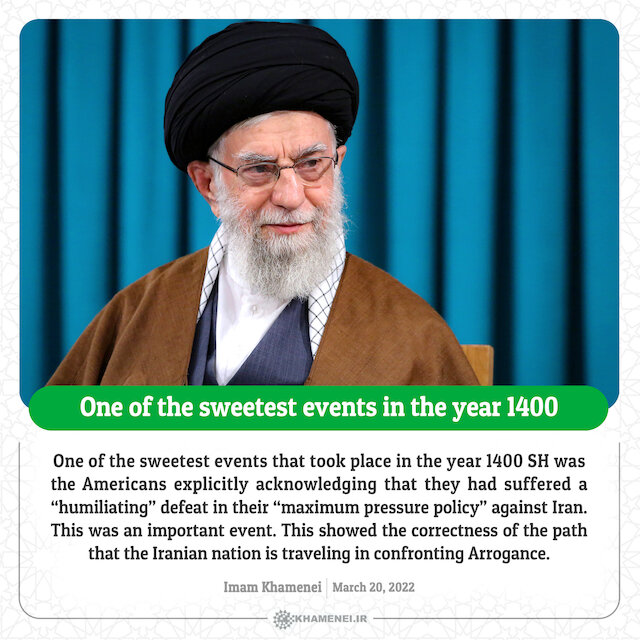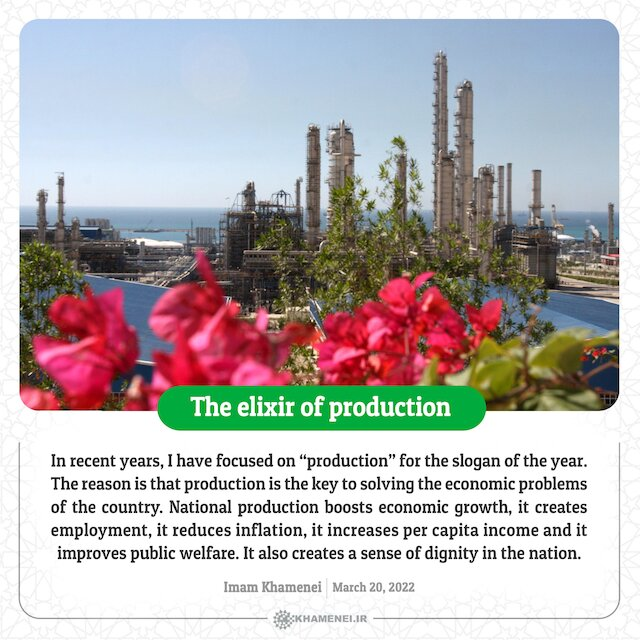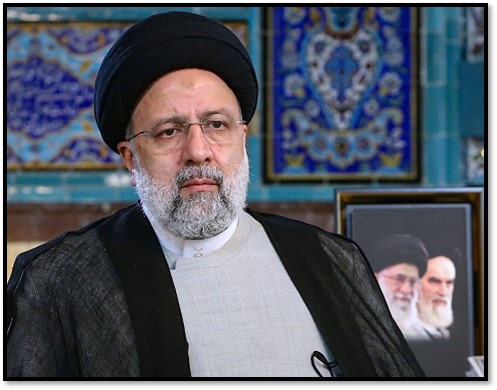On March 20-21, Iran’s leaders marked Nowruz, the Persian New Year and the first day of spring, with defiant messages about U.S. efforts to economically coerce the government. “Despite sanctions, the government has been able to increase foreign trade, sign new regional contracts, and make improvements in the issue of oil and other economic matters,” Supreme Leader Ayatollah Ali Khamenei said in a televised address on March 21. In his first Nowruz address since taking office in August, President Ebrahim Raisi boasted that Iran’s was not “idle” during talks between the world’s six major powers and Iran in Vienna to restore the 2015 nuclear deal. “Everyone saw that while negotiating and using political and legal tools to eliminate the sanctions, we focused on neutralizing the sanctions.”
Neither leader spoke at length on foreign policy, but Raisi lauded his government for restoring “balance” to foreign policy and not allowing “outsiders” to determine Iran’s fate. “We do not trade the interests and security of the people for anything,” he pledged. “Everyone saw that we prioritized increasing the country’s defense, missile and space capabilities.”
 Khamenei claimed that Iran has confronted the “arrogant powers,” his term for United States and its European allies. He declared “victory” over U.S. attempts to intimidate or sway Tehran. “One of the sweetest events that took place in the year 1400 was the Americans explicitly acknowledging—just recently—that they had suffered a ‘humiliating’ defeat in their ‘maximum pressure policy’ against Iran.”
Khamenei claimed that Iran has confronted the “arrogant powers,” his term for United States and its European allies. He declared “victory” over U.S. attempts to intimidate or sway Tehran. “One of the sweetest events that took place in the year 1400 was the Americans explicitly acknowledging—just recently—that they had suffered a ‘humiliating’ defeat in their ‘maximum pressure policy’ against Iran.”
He blasted the United States for its long wars in the region. “Look at the case of Afghanistan and how the U.S. withdrew. Firstly, they stayed in Afghanistan for 20 years,” he said on March 21. “What did they do in this oppressed, Muslim country? Then, how did they leave? They created problems for the people and now they’re not giving the Afghan people their own money.”
He blamed the West for the turmoil in Europe. “The developments in Ukraine are another example,” he said. “The president of that country, who was installed by the West, uses a harsh tone when addressing the West.”
Khamenei also criticized Saudi Arabia, Iran’s main regional rival. “Look at the issue of Yemen where these innocent, truly resilient people are being bombarded on a daily basis,” he said. “Look at what Saudi Arabia does in beheading 80 teenagers and young men in a single day.”
The main thrust of the government’s Nowruz messages centered on the economy. Khamenei acknowledged severe challenges over the past year. “The most severe, important of these bitter moments in my opinion are such things as the problems that exist for the livelihood of the people, the issue of high prices, inflation and the like,” he said on March 20. “Not all of them can be resolved at once. They will be resolved little by little. If one is impatient and hasty and says that all of the problems must be solved very quickly, this is not realistic.”
Raisi said that his government would prioritize job creation in the new year. “Unemployment is the source of all economic and social disasters and supporting production will be at the top of the government's plans,” he said on March 20. But he offered few specifics about his plans.
In two speeches, Khamenei called on the government to increase domestic production, which “boosts economic growth, creates employment, reduces inflation, increases per capita income, and improves public welfare,” he said on March 20. For decades, Iran has been dependent on the lucrative oil and gas industry. Khamenei has long urged the government to diversify. The following are statements by Iranian officials on Nowruz.
Supreme Leader Ayatollah Ali Khamenei
In speeches on March 20 and March 21:
On foreign policy
“When one looks at current developments in the world, the rightfulness and correctness of the Iranian nation in its confrontation with the Front of Arrogance (Western powers) becomes clearer than ever. Our nation didn’t choose surrendering to the arrogant powers. It chose resistance, independence and internal strength. This was the people’s decision.” (March 21)
“Look at the case of Afghanistan and how the U.S. withdrew. Firstly, they stayed in Afghanistan for 20 years. What did they do in this oppressed, Muslim country? Then, how did they leave? They created problems for the people and now they’re not giving the Afghan people their own money.” (March 21)
“Look at the issue of Yemen where these innocent, truly resilient people are being bombarded on a daily basis. Look at what Saudi Arabia does in beheading 80 teenagers and young men in a single day.” (March 21)
“The developments in Ukraine are another example. The president of that country, who was installed by the West, uses a harsh tone when addressing the West.” (March 21)
“In the world, oppression is taking place in countries that obey the West and you don’t hear a word about it. While inflicting all this oppression and atrocities, they claim to be advocates of human rights. Then they use their claim to pressure & threaten independent nations.” (March 21)
“One of the sweetest events that took place in the year 1400 was the Americans explicitly acknowledging—just recently—that they had suffered a ‘humiliating’ defeat in their ‘maximum pressure policy’ against Iran. The term ‘humiliating’ was a term they themselves used. This was an important event. The Iranian nation was victorious. The Iranian nation won. No single person in particular can claim credit for this. It was the resistance of the Iranian nation that brought about such a great victory.” (March 20)
On the economy
“The country’s new policies have shown that the country’s economy should not be tied to U.S. sanctions. Despite sanctions, the government has been able to increase foreign trade, sign new regional contracts, and make improvements in the issue of oil and other economic matters.” (March 21)
 “Now that oil prices are up, two approaches can be adopted with oil revenues. One, with increased foreign revenues, we boost imports to improve people’s welfare. This seems good but wastes our assets. Two, use oil revenues to improve infrastructure and strengthen the economy’s foundation.” (March 21)
“Now that oil prices are up, two approaches can be adopted with oil revenues. One, with increased foreign revenues, we boost imports to improve people’s welfare. This seems good but wastes our assets. Two, use oil revenues to improve infrastructure and strengthen the economy’s foundation.” (March 21)
“By a knowledge-based economy, I mean adopting a scientific, technological approach in all fields. The result of this will be a reduction in the cost of production, an increase in efficiency, an improvement in the quality of products, goods and products becoming competitive in global markets, and a reduction in the final price of products inside the country.” (March 21)
“The most severe, important of these bitter moments (from last year) in my opinion are such things as the problems that exist for the livelihood of the people, the issue of high prices, inflation and the like. Well, these problems must definitely be solved. These problems are solvable. These are economic problems, a part of which I hope will be resolved this year. Not all of them can be resolved at once. They will be resolved little by little. If one is impatient and hasty and says that all of the problems must be solved very quickly, this is not realistic.” (March 20)
“National production is indeed the main path that needs to be taken for moving past the economic hardships and difficulties that exist in the country. In other words, the most important economic issues of the country can be resolved by boosting and improving national production.” (March 20)
“That is why we have placed great emphasis on production; because it boosts economic growth, it creates employment, it reduces inflation, it increases per capita income, and it improves public welfare. Furthermore, it also brings about psychological effects since it boosts national self-confidence and creates a sense of dignity in the nation. Production is such an elixir. National production is this important if it is carried out in the best possible way, God willing.” (March 20)
“I wish to highlight production this year too, but with a new added layer and a new aspect. I wish to emphasize a production that has two characteristics: one is that it should create jobs and the other is that it should be knowledge-based. We must encourage knowledge-based production–one that is reliant on new scientific advances–and a production that generates employment. Of course, all kinds of production generate employment. But some kinds of production do not create much employment despite the fact that they require a huge investment while other kinds of production create abundant employment opportunities.” (March 20)
“If we make knowledge-based production the main criterion, and if we pursue the kind of production that is knowledge-based with the characteristics that I will mention in my New Year’s speech, I believe we will witness tangible progress and a good move forward in achieving all of our economic goals. The same is true of production that creates jobs. Therefore, this year’s slogan is ‘Production: Knowledge-Based and Job-Creating.’” (March 20)
On the 2021 presidential election
“Despite the fact that the pandemic was at its peak in early 1400, the people went to the ballot boxes and cast their votes. This is very important. This took place despite the fact that even two individuals gathering in one particular point was dangerous. In those days, we were witnessing death rates in the hundreds–500, 600 and at times even more individuals in a day. The elections were held in such circumstances. The people went to the polls and participated in the elections. The result was that a new Administration entered the arena.
“The evidence shows that this Administration [headed by President Raisi] is a popular administration, which is concerned about the goals of the people and which moves on a different path from the previous honorable Administration. This Administration has revived hope in the people, praise God.” (March 20)
On the pandemic
“This disease was confronted and combatted in the true sense of the word. Death rates dropped from several hundred a day to 18 or 20 at times. Although the death rates have risen to a certain extent again, there is a drastic difference between these days when the vaccine is available to everyone and those days.” (March 20)
President Ebrahim Raisi
In a speech on March 20:
On the economy
“We said that we would not let the country and the economy sit idle for the Joint Comprehensive Plan of Action (JCPOA), everyone saw that while negotiating and using political and legal tools to eliminate the sanctions, we focused on neutralizing the sanctions.”
 “Everyone saw from the first months how we activated the suspended capacities, thanks to God Almighty and the people. Fortunately, signs of economic growth and stability and a significant increase in the value of foreign trade and non-oil exports have emerged during this period. We increased trade with our neighbors for the benefit of the people.
“Everyone saw from the first months how we activated the suspended capacities, thanks to God Almighty and the people. Fortunately, signs of economic growth and stability and a significant increase in the value of foreign trade and non-oil exports have emerged during this period. We increased trade with our neighbors for the benefit of the people.
“We said that the main goal of the government is to curb inflation and implement inflation-eliminating policies. With God's help, this movement began and today the slope of inflation in the last quarter of the year decreased. Statistics prove this claim.
“We said that we will drive the production wheel powerfully. Official statistics, which are still up to the end of the third quarter, show that economic growth has reached above five percent.
“I am directly aware of your sufferings, and I have touched it on provincial trips and in public meetings with the people.
“In the seven months of the government’s term of office, many efforts have been made to improve the living conditions of the people and control inflation, and we have also paid special attention to the poor, and God willing, we will continue to do so.
“Since the government's term of office, many closed and semi-closed workshops returned to production.
“This year, God willing, employment is our first issue. Unemployment is the source of all economic and social disasters, and supporting production will be at the top of the government's plans.
“During this period, many programs have been pursued in launching large-scale national projects and regional projects.
“In the field of housing production, curbing inflation and creating jobs, measures have been taken, the results of which will soon be seen in the country.
“With God's help and without a doubt, this year the Iranian nation will see the result of their perseverance and endurance. As in the past, the results of their endurance and resistance have been proved.”
On foreign policy and national security
“Your government, with active diplomacy, has restored balance to foreign policy. The country’s greatest achievement in recent years has been the scandalous failure of the Americans’ policy of ‘maximum pressure,’ which was made possible by the resistance of the Iranian people.”
“We did not seek the fate of the nation in the hands of outsiders. We put aside dualism and distancing, which undermines the power of the nation. We have shown that the power in the [battle-] field is in favor of the power of diplomacy. Diplomacy can serve health. We used foreign relations in the service of society's economy, and that is the meaning of a transformational and justice-oriented government.”
“We said that we do not trade the interests and security of the people for anything. Everyone saw that we prioritized increasing the country’s defense, missile and space capabilities, because the country's security is a priority.”
“During the eight years of the imposed war (1980-188 war with Iraq), the East and the West of the world lined up on a single front against Iran's independence, but today they are competing to interact with Iran. This is the greatness of the great nation of Iran.”
